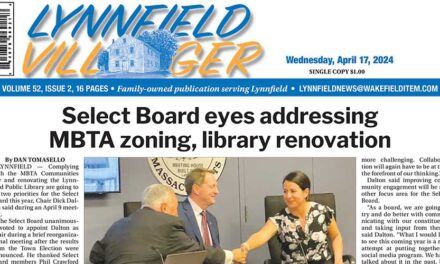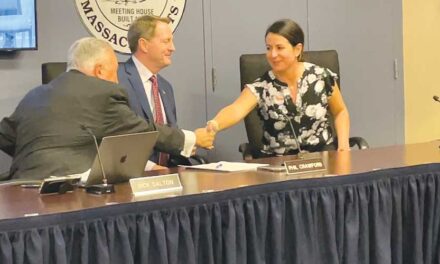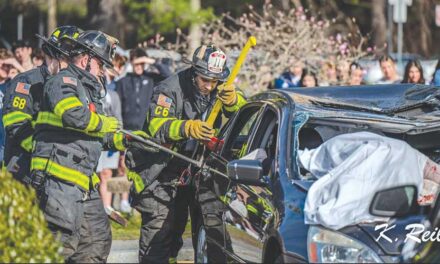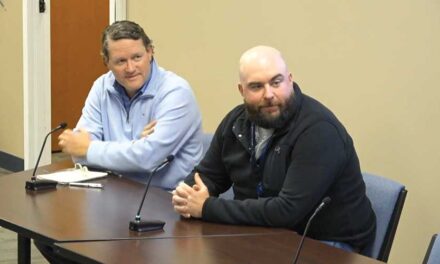Published in the April 19, 2017 edition
By MAUREEN DOHERTY
LYNNFIELD — Call it the case of the incredibly shrinking Town Meeting Warrant.
For a variety of reasons, the number of articles the town’s voters will be asked to act upon Monday night at the Annual Town Meeting has been streamlined as several of the original 29 articles contained in the warrant will be passed over.
Regardless of the ultimate number of articles to be acted upon, without a minimum quorum of 175 registered voters who call Lynnfield home in attendance at the Lynnfield Middle School auditorium when the gavel falls at 7:30 p.m., no action may be taken on any of the remaining articles, including those that will determine the town’s spending plan in the next fiscal year.
Budgets recommended by selectmen
The Board of Selectmen has voted to recommend approval of both the FY18 operating budget of $53.2M under Article 7 in the Town Meeting Warrant and the FY18 capital budget of $1,79,418 under Article 8, both as proposed by Town Administrator Jim Boudreau.
Earlier this month at the Finance Committee’s public hearing on the town budget, the members also voted to recommend passage of both Articles 7 and 8.
Controversial articles being passed over
Among the controversial articles to be passed over are two citizens’ petitions. Town Administrator Jim Boudreau said that according to town counsel because the Town Meeting warrant had already been posted these articles cannot be withdrawn simply upon the request of the 10 citizens who sponsored them. Instead, the voters will have to act to pass over or postpone indefinitely each petition.
• Article 23 was a citizens’ petition requesting a change in the zoning bylaws to enable an 800-seat cinema with eight screens into the mix of 475,000 square feet of retail and office space at MarketStreet. National Development’s Managing Partner Ted Tye told the board at a special public meeting on April 3 that based on feedback they’ve received they want to hold off until October Town Meeting to have more time to conduct traffic studies on their proposals.
National Development will also pay for the town to conduct an independent peer review study. The selectmen are in the process of forming an advisory committee that will include various town officials and neighborhood residents to also study the matter.
Article 29 was a citizens’ petition proposed by several Lynnfield residents seeking to rename the LMS in honor of the late firefighter Alan Melanson. Upon receiving a letter from Melanson’s widow stating that her family had not been consulted about this proposal by the petition’s sponsors and that her family did not wish to pursue it any further, Selectmen Chairman Phil Crawford advised the board that they should vote not to recommend this article and not to discuss it any further. Selectmen Chris Barrett and Dick Dalton agreed.
Article 15 is also being passed over at the recommendation of T.A. Jim Boudreau. It was a placeholder related to the building of a clubhouse at the King Rail Golf Course but due to the bids coming in over budget, the project is not ready and will need to be re-bid. The 9-hole course will continue to be served by a temporary trailer.
ZBL recodification on hold
At the request of the Planning Board, three articles the board had sponsored will also be passed over.
Articles 17, 18 and 19 deal with the re-codification of the town’s Zoning Bylaws (ZBL). While the Planning Board has spent the better part of a year attempting to navigate the maze of changes in the town’s ZBL, which dates back to 1954, with the help of an expert law firm in such matters, board Chairman John Faria told the selectmen on April 11 that they are recommending that all three articles be postponed until October Town Meeting due to the complexity involved. He also wanted to assure the voters that the changes being proposed are not “substantive.”
At present, there is not one single repository that contains the entirety of all of the changes to the town’s ZBL, Faria said, explaining that this task has involved cross-referencing all actions taken at past Town Meetings through a review of warrants and Town Reports in order to form a starting point.
New cable fee fund
Due to a change in state law in how cable-related fees paid to cities and towns under cable franchise agreements, the town is being requested to accept MGL Ch. 44, Sec. 53F 3/4 to establish a special revenue fund known as the PEG Access and Cable Related Fund. This is proposed under Article 6 of the warrant.
Article 14
Voters will have a chance to amend the town’s General Bylaws that would give the Town Moderator the authority to declare a two-thirds majority by voice vote rather than paper ballot for those articles requiring a two-thirds majority to pass that were not approved unanimously. The change still allows seven voters to stand if they object to the voice vote declaration on an individual article to demand a paper ballot. Article 14 is proposed as a means to speed up the process at Town Meeting and is supported by the selectmen and the FinCom.
Article 16 is also recommended by both the selectmen and FinCom and adopts a state law related to how funds are applied when the town borrows money.
Pot ban recommended
Articles 20 and 21 deal with locally banning the retail sale of recreational marijuana within the town’s borders and its passage is the second step in the process recommended by town counsel Tom Mullen as a means to handle the fallout from the passage at the state level last fall of a ballot measure approving such retail recreational sales. Both measures passed at the polls in the town election.
Article 22 would establish a temporary moratorium on the retail sale of pot if the state or the courts rule that towns cannot prohibit the retail sales ban authorized by the passage of Articles 20 and 21. The moratorium would enable the town to formulate regulations regarding such retail establishments. None of these articles affect the retail sales of medical marijuana in town. All three articles are recommend by the selectmen and the FinCom.
Rail trail article
The two selectmen eligible to vote on Article 24, the citizens’ petition seeking to authorize the board to execute of lease of up to 99 years with the MBTA for the Lynnfield portion of the Wakefield-Lynnfield rail trail, do not support it.
Both selectmen Phil Crawford and Dick Dalton opposed the measure, stating it is too premature to enter into such an agreement at this time and there are too many unanswered questions. Selectmen Chairman Chris Barrett recused himself from the debate at the three meetings during which it has been discussed this year because his sister lives within 300 feet of the proposed trail. The FinCom will offer its recommendation at Town Meeting.
Fields upgrades
Under Articles 25, 26 and 27, the Fields Committee is seeking funds to complete various aspects of the town-wide playing fields and playgrounds.
Due to the high cost of Jordan Park and its current ability to function to a degree for youth-level soccer games and other activities, Article 26 will be passed over. According to Fields Com. Chairman Arthur Bourque, Jordan Park would be the most likely candidate for private funding as the upgrades there are pegged at about $1.5M to improve the fields and expand the parking lot and add a children’s playground.
Under Articles 25 and 27, the town had prioritized the needs of the schools and parks and determined that through bonding the town can fund under the existing levy limit the reconstruction of the dilapidated track and field at LMS that has not been able to host a home meet in four years as well as the most pressing needs to address safety concerns at both the Summer Street and Huckleberry Hill elementary schools.
Boiler plate
A good portion of the warrant articles deal with boiler plate financial matters, such as Articles 1-5 while Articles 9 and 10 would add funds to the town’s stabilization and capital facilities funds, respectively and Article 11 is the standard reauthorization for six revolving accounts (Council on Aging, Board of Heath, Library, Recreation, Public Works athletic field maintenance fees and upkeep of the Merritt Center).
Similarly, Articles 12 and 13 reauthorize the town’s EMS enterprise fund and the Golf Enterprise Retained Earnings, respectively, to pay contractual obligations.




